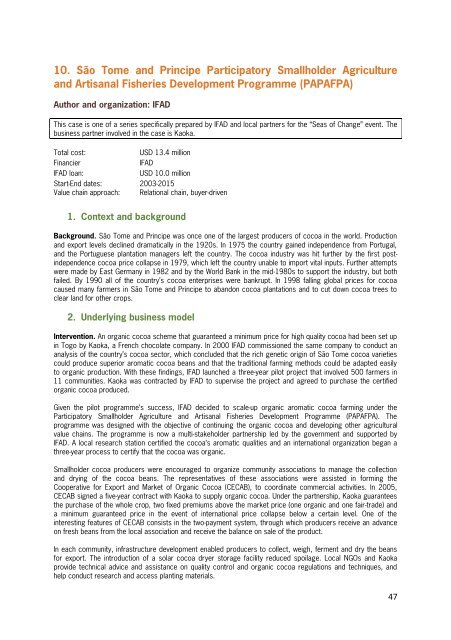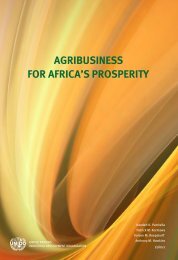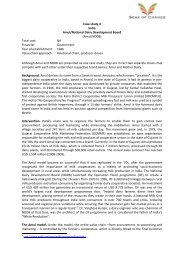Collection of Case Studies 2. - Seas of Change Initiative
Collection of Case Studies 2. - Seas of Change Initiative
Collection of Case Studies 2. - Seas of Change Initiative
You also want an ePaper? Increase the reach of your titles
YUMPU automatically turns print PDFs into web optimized ePapers that Google loves.
10. São Tome and Principe Participatory Smallholder Agricultureand Artisanal Fisheries Development Programme (PAPAFPA)Author and organization: IFADThis case is one <strong>of</strong> a series specifically prepared by IFAD and local partners for the “<strong>Seas</strong> <strong>of</strong> <strong>Change</strong>” event. Thebusiness partner involved in the case is Kaoka.Total cost:USD 13.4 millionFinancierIFADIFAD loan:USD 10.0 millionStart-End dates: 2003-2015Value chain approach: Relational chain, buyer-driven1. Context and backgroundBackground. São Tome and Principe was once one <strong>of</strong> the largest producers <strong>of</strong> cocoa in the world. Productionand export levels declined dramatically in the 1920s. In 1975 the country gained independence from Portugal,and the Portuguese plantation managers left the country. The cocoa industry was hit further by the first postindependencecocoa price collapse in 1979, which left the country unable to import vital inputs. Further attemptswere made by East Germany in 1982 and by the World Bank in the mid-1980s to support the industry, but bothfailed. By 1990 all <strong>of</strong> the country’s cocoa enterprises were bankrupt. In 1998 falling global prices for cocoacaused many farmers in São Tome and Príncipe to abandon cocoa plantations and to cut down cocoa trees toclear land for other crops.<strong>2.</strong> Underlying business modelIntervention. An organic cocoa scheme that guaranteed a minimum price for high quality cocoa had been set upin Togo by Kaoka, a French chocolate company. In 2000 IFAD commissioned the same company to conduct ananalysis <strong>of</strong> the country’s cocoa sector, which concluded that the rich genetic origin <strong>of</strong> São Tome cocoa varietiescould produce superior aromatic cocoa beans and that the traditional farming methods could be adapted easilyto organic production. With these findings, IFAD launched a three-year pilot project that involved 500 farmers in11 communities. Kaoka was contracted by IFAD to supervise the project and agreed to purchase the certifiedorganic cocoa produced.Given the pilot programme’s success, IFAD decided to scale-up organic aromatic cocoa farming under theParticipatory Smallholder Agriculture and Artisanal Fisheries Development Programme (PAPAFPA). Theprogramme was designed with the objective <strong>of</strong> continuing the organic cocoa and developing other agriculturalvalue chains. The programme is now a multi-stakeholder partnership led by the government and supported byIFAD. A local research station certified the cocoa’s aromatic qualities and an international organization began athree-year process to certify that the cocoa was organic.Smallholder cocoa producers were encouraged to organize community associations to manage the collectionand drying <strong>of</strong> the cocoa beans. The representatives <strong>of</strong> these associations were assisted in forming theCooperative for Export and Market <strong>of</strong> Organic Cocoa (CECAB), to coordinate commercial activities. In 2005,CECAB signed a five-year contract with Kaoka to supply organic cocoa. Under the partnership, Kaoka guaranteesthe purchase <strong>of</strong> the whole crop, two fixed premiums above the market price (one organic and one fair-trade) anda minimum guaranteed price in the event <strong>of</strong> international price collapse below a certain level. One <strong>of</strong> theinteresting features <strong>of</strong> CECAB consists in the two-payment system, through which producers receive an advanceon fresh beans from the local association and receive the balance on sale <strong>of</strong> the product.In each community, infrastructure development enabled producers to collect, weigh, ferment and dry the beansfor export. The introduction <strong>of</strong> a solar cocoa dryer storage facility reduced spoilage. Local NGOs and Kaokaprovide technical advice and assistance on quality control and organic cocoa regulations and techniques, andhelp conduct research and access planting materials.47







